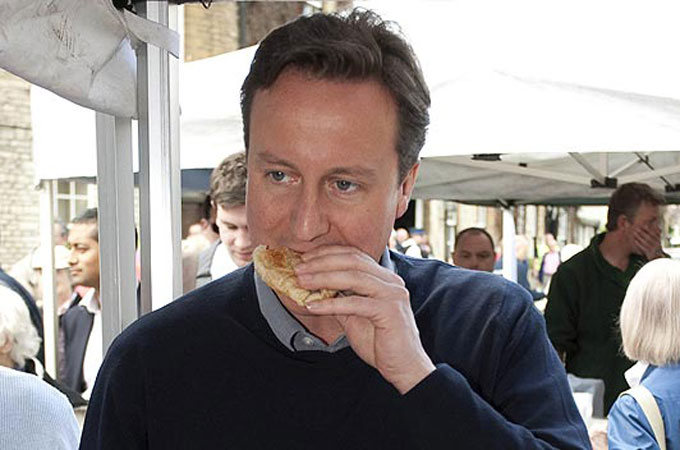‘Pasty tax’ row heats up for British PM
Sales tax on heated snacks, including iconic Cornish pasty, puts David Cameron and his finance minister in a hot spot.

 |
| By imposing a sales tax on pasties, David Cameron’s government may have bitten off more than it can chew [AP] |
A British culinary staple finds itself at the centre of an unsavoury political row.
The prime minister claims to love them; his finance minister cannot remember the last time he had one, and the leader of the opposition prefers a sausage roll.
The hot snack in question is the pasty, a typically meat-filled pastry usually from the southwestern county of Cornwall, which has become an unlikely motif of popular dissent against budget proposals cooked up last week by George Osborne, the finance minister.
The introduction in last week’s budget of a 20 per cent sales tax on pasties and other hot foods sold by bakeries and supermarkets, now known as the, “pasty tax”, has prompted observations that proletarian foodstuffs have been targeted, while luxury edibles remain untouched.
“We now live in a country where caviar is untaxed and a hot pasty is .. go figure,” tweeted influential blogger Guido Fawkes.
Adding fuel to the fire, “Pastygate” is causing problems for David Cameron after the prime minister’s efforts to show how much he loved the pasty by recalling a large one he had eaten at Leeds railway station proved somewhat flaky.
When asked when he last had a pasty, Cameron said: “I think the last one I bought was from the West Cornwall Pasty Company.
“I seem to remember I was in Leeds station at the time and the choice was whether to have one of their small ones or one of their large ones. I have got a feeling I opted for the large one, and very good it was too.”
But the Daily Telegraph ran with the headline “Oh crumbs” after it emerged that the shop where Cameron claimed to have bought the pasty had closed in 2007.
‘Pork pie probe’
The Sun ran with the headline “PM pasty ‘pork pie’ probe” – “pork pie” being rhyming slang for an untruth – and compared Osborne with Marie Antoinette, of “Let them eat cake” fame. The populist tabloid also offered readers a free pie, pasty or sausage roll, and urged them to protest at 1400 GMT by eating their product of choice in public.
| WHAT IS A CORNISH PASTY? | |||||||||||
|
Even the Times could not resist a pun by running with a sketch headed: “Dave tries to play catch-up but it’s all pie in the sky as Mr Pasty tells a porky”, while the Guardian joined in as well asking “Who ate all the pies?”
“Pastygate” blew up when Osborne, facing a grilling by a parliamentary committee on the decision to tax hot snacks, was asked when he had last visited Greggs, a popular high street bakery.
Osborne, who usually answers questions on fiscal stimuls or deficit reduction, looked out of his depth and said he could not recall.
Ken McMeikan, Greggs’ chief executive, warned that in current economic circumstances his company could be forced to cut jobs if pasty prices rise by 20 per cent, and attacked Osborne for being out of touch.
One tweet suggested that Osborne was probably subjected to a Treasury presentation where he was told that pasties were “similar to mini boeufs en croute,” referring to his priviliged background.
With petrol prices on the rise, causing last minute panic-buys at petrol forecourts in the UK, the Daily Mail attacked the government with the headline: “Petrol, pasties and the politics of panic.”
It said both Cameron and Osborne had conspired to plunge the government into a combination of high farce and panic.
As Cameron has been caught with a pasty in his mouth, the internet has gone viral with various humourous anecdotes to his love affair with the pasty.
The website www.cameronwithpasties.tumblr.com has created various pictures of Cameron holding, eating or even stroking a pasty.
Cornish backlash
In Cornwall, the Western Morning News, a regional newspaper, ran with the headline “Pasty battle,” and said the fight over Value Added Tax on its local product had turned personal.
Andrew George, a local member of parliament whose Liberal Democrat party is in coalition with Cameron’s Conservatives, said that Cornish people would “fight them on the beaches”.
“Pasties are not luxury food. It’s not like caviar or lobster sandwiches, which would be zero rated,” he said.
“For the chancellor to tell working Cornish folk that they can ‘eat their pasties cold’ fails to recognise the long tradition and how important this humble square meal is to working people in our country.”
Alex Folkes, a Liberal Democrat councillor for Launceston Central, used social media tools by organising a Facebook campaign, called Stop the Pasty Tax, which already has 5,000 members.
“I’m not saying that the tax means nobody will ever buy a pasty again,” says Folkes. “It would mean some people buying hot pasties less often and that could lead to job losses.”
Ann Muller, a pasty shop owner, said the tax was “basically a tax on the working man of Britain”.
“My hot pasties would go up by 50 pence ($0.79) for some people, that will make a big difference. I’m planning to put a sign up in the window: ‘Hot for the rich, and cold for the poor.'”
Not be outdone by the public mood, Ed Miliband, the opposition Labour leader, showed his allegiance to heated pastry products by visiting a Greggs bakers in Redditch, Worcestershire, and buying eight sausage rolls.
Follow Hasan Patel on Twitter: @hasanpatel
